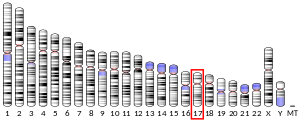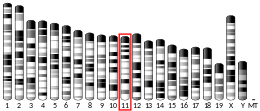WDR68
WD repeat-containing protein 68 is a protein that in humans is encoded by the DCAF7 gene.[5][6]
| DCAF7 | |||||||||||||||||||||||||
|---|---|---|---|---|---|---|---|---|---|---|---|---|---|---|---|---|---|---|---|---|---|---|---|---|---|
| Identifiers | |||||||||||||||||||||||||
| Aliases | DCAF7, AN11, HAN11, SWAN-1, WDR68, DDB1 and CUL4 associated factor 7 | ||||||||||||||||||||||||
| External IDs | OMIM: 605973 MGI: 1919083 HomoloGene: 55930 GeneCards: DCAF7 | ||||||||||||||||||||||||
| |||||||||||||||||||||||||
| |||||||||||||||||||||||||
| |||||||||||||||||||||||||
| Orthologs | |||||||||||||||||||||||||
| Species | Human | Mouse | |||||||||||||||||||||||
| Entrez | |||||||||||||||||||||||||
| Ensembl | |||||||||||||||||||||||||
| UniProt | |||||||||||||||||||||||||
| RefSeq (mRNA) | |||||||||||||||||||||||||
| RefSeq (protein) | |||||||||||||||||||||||||
| Location (UCSC) | Chr 17: 63.55 – 63.59 Mb | Chr 11: 106.04 – 106.06 Mb | |||||||||||||||||||||||
| PubMed search | [3] | [4] | |||||||||||||||||||||||
| Wikidata | |||||||||||||||||||||||||
| |||||||||||||||||||||||||
Interactions
WDR68 has been shown to interact with DYRK1A.[7]
gollark: Back in the day CC's VM didn't sandbox it very well and you could use the string metatable for communication.
gollark: In CC at least you can set metatables for ALL types.
gollark: Or, well, you can use it for that.
gollark: Pretty much.
gollark: `("bees"):reverse()` → `"seeb"`.
References
- GRCh38: Ensembl release 89: ENSG00000136485 - Ensembl, May 2017
- GRCm38: Ensembl release 89: ENSMUSG00000049354 - Ensembl, May 2017
- "Human PubMed Reference:". National Center for Biotechnology Information, U.S. National Library of Medicine.
- "Mouse PubMed Reference:". National Center for Biotechnology Information, U.S. National Library of Medicine.
- de Vetten N, Quattrocchio F, Mol J, Koes R (Jul 1997). "The an11 locus controlling flower pigmentation in petunia encodes a novel WD-repeat protein conserved in yeast, plants, and animals". Genes Dev. 11 (11): 1422–34. doi:10.1101/gad.11.11.1422. PMID 9192870.
- "Entrez Gene: WDR68 WD repeat domain 68".
- Skurat AV, Dietrich AD (Jan 2004). "Phosphorylation of Ser640 in muscle glycogen synthase by DYRK family protein kinases". J. Biol. Chem. 279 (4): 2490–8. doi:10.1074/jbc.M301769200. PMID 14593110.
Further reading
- Bonaldo MF, Lennon G, Soares MB (1996). "Normalization and subtraction: two approaches to facilitate gene discovery". Genome Res. 6 (9): 791–806. doi:10.1101/gr.6.9.791. PMID 8889548.
- Skurat AV, Dietrich AD (2004). "Phosphorylation of Ser640 in muscle glycogen synthase by DYRK family protein kinases". J. Biol. Chem. 279 (4): 2490–8. doi:10.1074/jbc.M301769200. PMID 14593110.
- Bouwmeester T, Bauch A, Ruffner H, Angrand PO, Bergamini G, Croughton K, Cruciat C, Eberhard D, Gagneur J, Ghidelli S, Hopf C, Huhse B, Mangano R, Michon AM, Schirle M, Schlegl J, Schwab M, Stein MA, Bauer A, Casari G, Drewes G, Gavin AC, Jackson DB, Joberty G, Neubauer G, Rick J, Kuster B, Superti-Furga G (2004). "A physical and functional map of the human TNF-alpha/NF-kappa B signal transduction pathway". Nat. Cell Biol. 6 (2): 97–105. doi:10.1038/ncb1086. PMID 14743216.
- Benzinger A, Muster N, Koch HB, Yates JR, Hermeking H (2005). "Targeted proteomic analysis of 14-3-3 sigma, a p53 effector commonly silenced in cancer". Mol. Cell. Proteomics. 4 (6): 785–95. doi:10.1074/mcp.M500021-MCP200. PMID 15778465.
- Rual JF, Venkatesan K, Hao T, Hirozane-Kishikawa T, Dricot A, Li N, Berriz GF, Gibbons FD, Dreze M, Ayivi-Guedehoussou N, Klitgord N, Simon C, Boxem M, Milstein S, Rosenberg J, Goldberg DS, Zhang LV, Wong SL, Franklin G, Li S, Albala JS, Lim J, Fraughton C, Llamosas E, Cevik S, Bex C, Lamesch P, Sikorski RS, Vandenhaute J, Zoghbi HY, Smolyar A, Bosak S, Sequerra R, Doucette-Stamm L, Cusick ME, Hill DE, Roth FP, Vidal M (2005). "Towards a proteome-scale map of the human protein-protein interaction network". Nature. 437 (7062): 1173–8. doi:10.1038/nature04209. PMID 16189514.
- Kimura K, Wakamatsu A, Suzuki Y, Ota T, Nishikawa T, Yamashita R, Yamamoto J, Sekine M, Tsuritani K, Wakaguri H, Ishii S, Sugiyama T, Saito K, Isono Y, Irie R, Kushida N, Yoneyama T, Otsuka R, Kanda K, Yokoi T, Kondo H, Wagatsuma M, Murakawa K, Ishida S, Ishibashi T, Takahashi-Fujii A, Tanase T, Nagai K, Kikuchi H, Nakai K, Isogai T, Sugano S (2006). "Diversification of transcriptional modulation: large-scale identification and characterization of putative alternative promoters of human genes". Genome Res. 16 (1): 55–65. doi:10.1101/gr.4039406. PMC 1356129. PMID 16344560.
- Morita K, Lo Celso C, Spencer-Dene B, Zouboulis CC, Watt FM (2006). "HAN11 binds mDia1 and controls GLI1 transcriptional activity". J. Dermatol. Sci. 44 (1): 11–20. doi:10.1016/j.jdermsci.2006.06.001. PMID 16887337.
- Nissen RM, Amsterdam A, Hopkins N (2006). "A zebrafish screen for craniofacial mutants identifies wdr68 as a highly conserved gene required for endothelin-1 expression". BMC Dev. Biol. 6 (28): 28. doi:10.1186/1471-213X-6-28. PMC 1523201. PMID 16759393.
- Mazmanian G, Kovshilovsky M, Yen D, Mohanty A, Mohanty S, Nee A, Nissen RM (2010). "The zebrafish dyrk1b gene is important for endoderm formation". Genesis. 48 (1): 20–30. doi:10.1002/dvg.20578. PMC 2806492. PMID 20014342.
- Ritterhoff S, Farah CM, Grabitzki J, Lochnit G, Skurat AV, Schmitz ML (2010). "The WD40-repeat protein Han11 functions as a scaffold protein to control HIPK2 and MEKK1 kinase functions". EMBO J. 29 (22): 3750–61. doi:10.1038/emboj.2010.251. PMC 2989105. PMID 20940704.
External links
- DCAF7 human gene location in the UCSC Genome Browser.
- DCAF7 human gene details in the UCSC Genome Browser.
This article is issued from Wikipedia. The text is licensed under Creative Commons - Attribution - Sharealike. Additional terms may apply for the media files.



